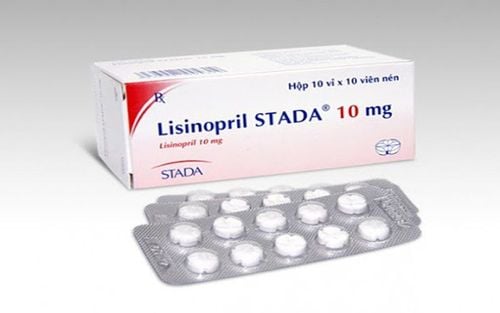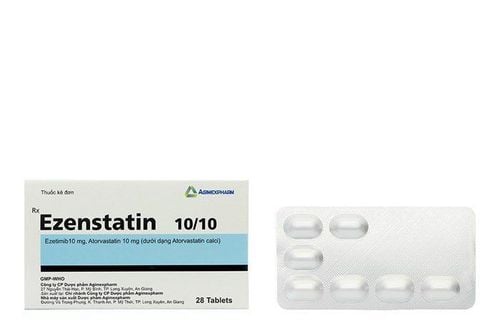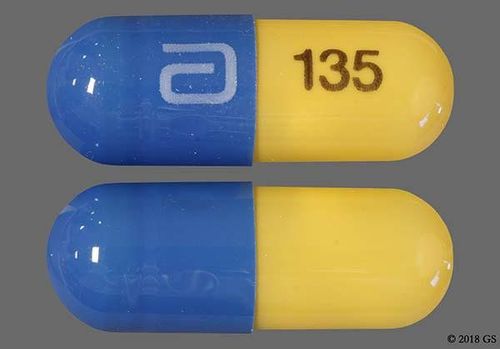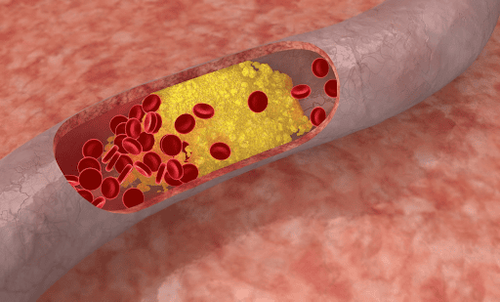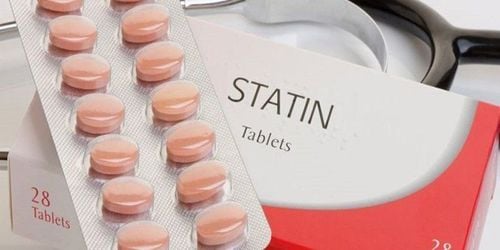This is an automatically translated article.
Metabolic diseases are on the rise, including dyslipidemia. One of the tests that can assess this condition is the blood cholesterol test. So what does a cholesterol screening test include, how is it done, and what do these tests mean? Let's find out in the following article.1. What is a cholesterol test?
A complete cholesterol test kit is also known as a lipid panel or lipid bilan. Your doctor can use it to measure good cholesterol, bad cholesterol, and triglycerides. They are certain types of fats in your blood.Cholesterol is a soft, waxy fat that your body needs to function properly. However, too much cholesterol can lead to cardiovascular disease, stroke, atherosclerosis, blockage or hardening of your arteries.
If you're a man, you should have your cholesterol checked regularly, starting at age 35 or younger. If you're a woman, you should start having regular cholesterol checks at age 45 or earlier. To be on the safe side, you may want to have your cholesterol checked every 5 years, starting at age 20. If you've been diagnosed with diabetes, heart disease, stroke, or high blood pressure, or if you're taking medication To control your cholesterol levels, you should have your cholesterol checked annually.
2. Who is at risk of high cholesterol?

Việc kiểm tra cholesterol đối với người thừa cân, béo phì là rất quan trọng
Family history of dyslipidemia or cardiovascular disease Overweight or obese Drink alcohol regularly Smoke cigarettes Have a sedentary lifestyle Having diabetes, kidney disease, polycystic ovary syndrome, or an underactive thyroid All of these can increase your risk of developing high cholesterol.
3. How to check cholesterol?
The complete cholesterol test measures four types of lipids or fats in your blood:Total cholesterol: This is the total amount of cholesterol in your blood. Low-density lipoprotein (LDL) cholesterol: This is called “bad” cholesterol. Too much of it increases the risk of heart attack, stroke, and atherosclerosis. High-density lipoprotein (HDL) cholesterol: This is called “good” cholesterol because it helps remove LDL cholesterol from your blood. Triglycerides: When you eat, your body converts unnecessary calories into triglycerides, which are stored in your fat cells. People who are overweight, have diabetes, eat too many sweets or drink too much alcohol may have high triglyceride levels.
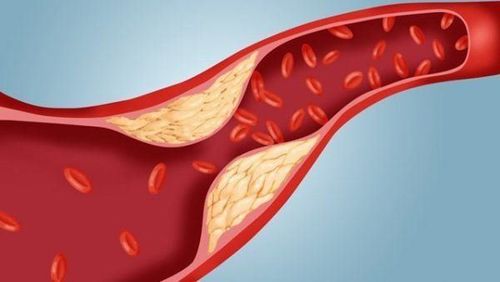
Xét nghiệm cholesterol hoàn chỉnh đo bốn loại lipid hoặc chất béo trong máu là: Cholesterol toàn phần, Cholesterol lipoprotein mật độ thấp (LDL), Cholesterol lipoprotein mật độ cao (HDL) và Triglyceride
4. What do you need to prepare for a cholesterol test?
In some cases, your doctor may ask you to fast before testing your cholesterol levels. If you're just checking your HDL and total cholesterol levels, you can eat before that. However, if you already want to have all your blood lipids checked, you should avoid eating or drinking anything other than water for 9 to 12 hours before the test.Before the test, you should also tell your doctor about:
Any symptoms or health problems you are having Your family history of heart health All medications and supplements that you are currently taking If you are taking medicines that can raise your cholesterol levels, such as birth control pills, your doctor may ask you to stop taking them a few days before the test.
5. How is the Cholesterol test done?
To check your cholesterol levels, your doctor will need to take a sample of your blood. You will probably have your blood drawn in the morning, sometimes after fasting from the night before.Blood cholesterol testing is done outpatient. It only takes a few minutes and is virtually painless. It is usually done in a diagnostic laboratory. In some cases, it can also be done during routine doctor visits, at your local pharmacy or even at home.
There are very few risks associated with having blood drawn for cholesterol testing. You may feel a little dizzy or achy or sore at the site of the blood draw. There is also a very small risk of infection at the puncture site.
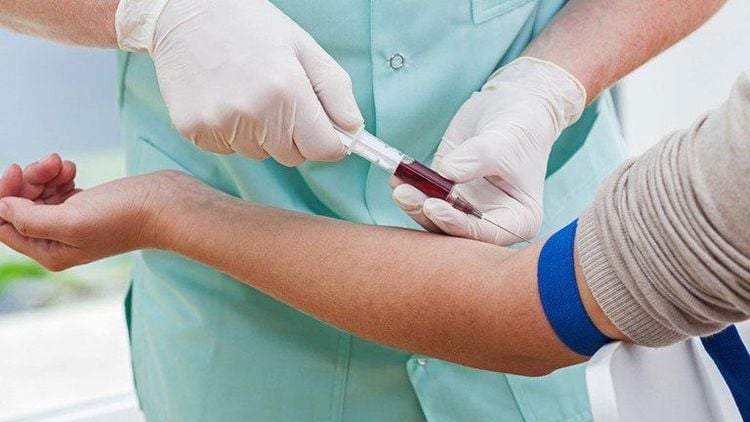
Để kiểm tra mức cholesterol, bác sĩ sẽ cần lấy mẫu máu của bạn
6. What do test results mean?
Cholesterol levels are measured in milligrams (mg) of cholesterol per deciliter (dL) of blood. Normal test results in most adults are:LDL: 70 to 130 mg/dL (the lower the number the better) HDL: over 40 to 60 mg/dL (the higher the number the better) Total cholesterol portion: less than 200 mg/dL (the lower the number the better) Triglyceride: 10 to 150 mg/dL (the lower the number the better) If your cholesterol number is outside the normal range, you may have increased risk of cardiovascular disease, stroke, and atherosclerosis. If your test results are abnormal, your doctor may order a blood sugar test to check for diabetes. Your doctor may also order thyroid function tests to determine if your thyroid gland is underactive.
In the United States, cholesterol levels are measured in mg/dl of blood. In Canada and many European countries, cholesterol levels are measured in mmol / L. Here are some values of cholesterol parameters that you can refer to
Total cholesterol
| (Mỹ và một số quốc gia khác) | (Canada và hầu hết Châu u) * | |
| Dưới 200 mg / dL | Dưới 5,2 mmol / L | Bình thường |
| 200-239 mg / dL | 5,2-6,2 mmol / L | Khá cao |
| Trên 240 mg / dL | Trên 6.2 mmol / L | Cao |
| (Mỹ và một số quốc gia khác) | (Canada và hầu hết Châu u) * | |
| Dưới 70 mg / dL | Dưới 1,8 mmol / L | Tối ưu cho những người có nguy cơ rất cao mắc bệnh tim |
| Dưới 100 mg / dL | Dưới 2,6 mmol / L | Tối ưu cho những người có nguy cơ bệnh tim |
| 100-129 mg / dL | 2,6-3,3 mmol / L | Bình thường |
| 130-159 mg / dL | 3,4-4,1 mmol / L | Khá cao |
| 160-189 mg / dL | 4,1-4,9 mmol / L | Cao |
| 190 mg / dL trở lên | > 4,9 mmol / L | Rất cao |
| (Mỹ và một số quốc gia khác) | (Canada và hầu hết Châu u)* | |
| < 40 mg / dL (nam) | < 1 mmol / L (nam) | Thấp |
| <50 mg / dL (nữ) | <1,3 mmol / L (nữ) | Bình thường |
| 50-59 mg / dL | 1,3-1,5 mmol / L | Tốt |
| 60 mg / dL trở lên | Trên 1,5 mmol / L |
| (Mỹ và một số quốc gia khác) | (Canada và hầu hết Châu u)* | |
| Dưới 150 mg / dL | Dưới 1,7 mmol / L | Tốt |
| 150-199 mg / dL | 1,7 - 2,2 mmol / L | Khá cao |
| 200-499 mg / dL | 2,3 - 5,6 mmol / L | Cao |
| 500 mg / dL trở lên | Trên 5,6 mmol / L | Rất cao |
7. Test results can be wrong?
In some cases, cholesterol test results may be wrong. For example, a study published in the Journal of the American Heart Association found that a popular method of calculating LDL cholesterol levels often produced inaccurate results.Improper fasting, medication, human error and many other factors can cause your test to give a false negative or a false positive. Testing both your HDL and LDL levels often gives more accurate results than just checking the LDL.
8. Next steps after testing and treatment results are available

Bạn nên bỏ thuốc lá và hạn chế rượu để giảm mức cholesterol
Quit smoking and limit alcohol intake. Avoid foods high in fat and high in sodium, and maintain a balanced diet. Eat a variety of vegetables, fruits, whole-grain products, low-fat dairy products, and lean protein sources. Exercise regularly. Aim to do 150 minutes of moderate-intensity aerobic activity each week, as well as two sessions of muscle-strengthening activities. Your doctor may put you on a “lifestyle modification treatment” regimen or the TLC diet. According to this meal plan, only 7% of your daily calories should come from saturated fat. It also requires that you get less than 200 mg of cholesterol from your food per day.
Some foods help your digestive tract absorb less cholesterol. For example, your doctor may encourage you to eat more:
Oats, barley and other whole grains Fruits such as apples, pears, bananas and oranges Vegetables like eggplant and okra Beans and legumes , such as kidney beans, chickpeas and lentils Obesity is also a common risk factor for high cholesterol and heart disease. Your doctor may encourage you to lose weight by cutting calories from your diet and exercising more.
Taking medications like statins can also help control your cholesterol. These drugs help lower your LDL levels.
In general, high cholesterol is manageable. Ask your doctor to help you create a treatment plan that you can stick to. It may include changes to your diet, exercise routine, and other daily routines. It may also include cholesterol-lowering medications. The more proactive you are in making lifestyle changes and taking your medications as prescribed, the better results you will have.
Currently, Vinmec International General Hospital is deploying Cardiovascular Screening service packages, including testing for blood cholesterol indexes that allow accurate assessment of cholesterol levels, thereby helping you to adjust. Diet, living, working accordingly and may be prescribed treatment if necessary.
If you have a need for medical examination at Vimec Health System nationwide, please make an appointment on the website to be served.
Please dial HOTLINE for more information or register for an appointment HERE. Download MyVinmec app to make appointments faster and to manage your bookings easily.
Reference source: healthline.com



